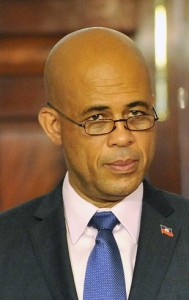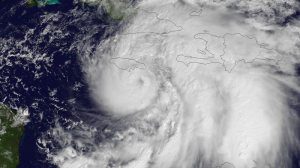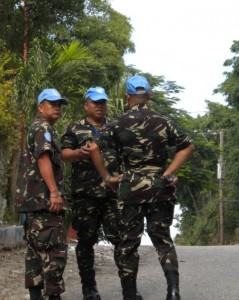Tag: cholera epidemic
In the News: Martelly to Haitians in South Florida: ‘Haiti has changed a lot’
by Jacqueline Charles and Nadege Green, The Miami Herald, Dec. 10, 2012
 Haitian President Michel Martelly said Monday he plans to introduce an amendment in parliament giving millions of Haitians living in the diaspora, including South Florida, the right to vote in future elections. “Of course it will be up to the parliament to decide if it goes through,” Martelly said during a press conference Monday after an all-day invitation-only diaspora forum with members of the Haitian-American community at the North Miami Beach Library.
Haitian President Michel Martelly said Monday he plans to introduce an amendment in parliament giving millions of Haitians living in the diaspora, including South Florida, the right to vote in future elections. “Of course it will be up to the parliament to decide if it goes through,” Martelly said during a press conference Monday after an all-day invitation-only diaspora forum with members of the Haitian-American community at the North Miami Beach Library.
Martelly arrived in Miami over the weekend after a tour of Japan. He said he proposed the South Florida visit and the meeting with the Haitian community “to first of all thank the diaspora for their support” during his historical 2011 presidential victory and “to inform them on the progress in Haiti and finally to find a way to engage them to help us really develop Haiti.”
“I believe there is more that can be done by the diaspora,” he said. “But before we even ask for anything, I thought it was very important that we come here to not just tell them what we do, but also show them.”
Continue reading In the News: Martelly to Haitians in South Florida: ‘Haiti has changed a lot’
In the News: UN must make amends for cholera that organization brought to Haiti
Editorial, Boston Globe, November 13, 2012
 When the international aid community descends on a vulnerable place, the first objective must be to do no harm. But all too often, good intentions make a bad situation even worse. That’s what happened two years ago, when United Nations peacekeepers arrived in Haiti in the wake of a devastating earthquake, bringing the deadly disease cholera with them.
When the international aid community descends on a vulnerable place, the first objective must be to do no harm. But all too often, good intentions make a bad situation even worse. That’s what happened two years ago, when United Nations peacekeepers arrived in Haiti in the wake of a devastating earthquake, bringing the deadly disease cholera with them.
Last year, a panel of UN experts concluded that poor sanitation at the peacekeepers’ camp was the likely cause of a terrible cholera outbreak that has so far killed 7,000 people and sickened 500,000. Their report declined to say whether the peacekeepers, the sanitation contractor, or the UN’s own inadequate health protocols were to blame for human waste getting into Haiti’s water supply. But as cholera deaths continue, new scientific evidence removes all doubt about the source of the disease: The strain of cholera that exploded in Haiti is an exact match to the cholera that exists in Nepal, the UN peacekeepers’ native country.
Continue reading In the News: UN must make amends for cholera that organization brought to Haiti
In the News: Haiti food crisis feared in Sandy’s wake
Originally posted at Al Jazeera English.
Officials fear rising food prices and an increase in cholera cases in Caribbean nation where storm killed 52 people.
 As Sandy causes havoc throughout the eastern US, the full extent of the storm’s damage is just beginning to emerge in the Caribbean nation of Haiti.
As Sandy causes havoc throughout the eastern US, the full extent of the storm’s damage is just beginning to emerge in the Caribbean nation of Haiti.
The UN is warning that flooding and unsanitary conditions could lead to a sharp increase in cases of cholera, while aid workers are worried that extensive crop damage will mean that food prices will rise.
Extensive damage to crops throughout the southern third of the country, as well as the high potential for a surge in cases of cholera and other water-borne diseases, could mean Haiti will see the deadliest effects of Sandy in the coming days and weeks.
Continue reading In the News: Haiti food crisis feared in Sandy’s wake
Press Release: Haiti is under new international dictatorship says author
Issued by Between the Lines Books. Originally posted at the Sacramento Bee
TORONTO, Oct. 29, 2012 — Justin Podur issues a powerful challenge and wake-up call to the international NGO and development community
TORONTO, Oct. 29, 2012 – Haiti is again living under a dictatorship, says author Justin Podur. Podur, author of Haiti’s New Dictatorship: The Coup, the Earthquake and the UN Occupation, explains that Haitians have no effective say over their economic and political affairs; their right to assemble and organize politically is sharply limited; and human rights violations are routine and go unpunished.
Podur says, “Last week conclusive evidence came out that the cholera outbreak that killed 7,500 people in Haiti came from the UN, with an accompanying note that there is no one to blame for it. In a way, this is true: the international regime that rules Haiti today diffuses responsibility so that thousands of people can die and there is no one to blame. Democracy and sovereignty could save lives in Haiti.”
Continue reading Press Release: Haiti is under new international dictatorship says author
In the News: Signs Point toward Controversial Renewal of MINUSTAH’s Mandate in Haiti
by Kevin Edmonds, NACLA
According to a report released on August 31 by Secretary-General Ban Ki Moon regarding the United Nations Mission for Stabilization in Haiti (MINUSTAH by its French acronym), it appears that the renewal of the highly controversial mission will occur once again without any meaningful debate. Moon’s report effectively acts as a rubber stamp of approval for the occupation, stating that he was “Reaffirming my commitment to continue to focus the activities of the Mission, I recommend that the Security Council extend its mandate of one year, until 15 October 2013.”
 MINUSTAH’s reputation and credibility as a stabilizing force has been shattered since the introduction of cholera into the island by the negligence of both the troops and shoddy base infrastructure in October 2010. Up until the deployment of Nepalese troops in the Artibonite Valley that October, Haiti had never experienced a cholera outbreak. According to the latest figures, the cholera epidemic has killed over 7,500 people, infecting another 590,000.
MINUSTAH’s reputation and credibility as a stabilizing force has been shattered since the introduction of cholera into the island by the negligence of both the troops and shoddy base infrastructure in October 2010. Up until the deployment of Nepalese troops in the Artibonite Valley that October, Haiti had never experienced a cholera outbreak. According to the latest figures, the cholera epidemic has killed over 7,500 people, infecting another 590,000.
To date, the United Nations has refused to take responsibility for their role in the epidemic, despite “irrefutable molecular evidence” that the Haitian strain was virtually identical to the Nepalese strain. Reports from American medical researchers at the Center for Disease Control, in addition to separate French and Danish teams, have all confirmed that the MINUSTAH base in Mirebalais was the source of the cholera strain.
